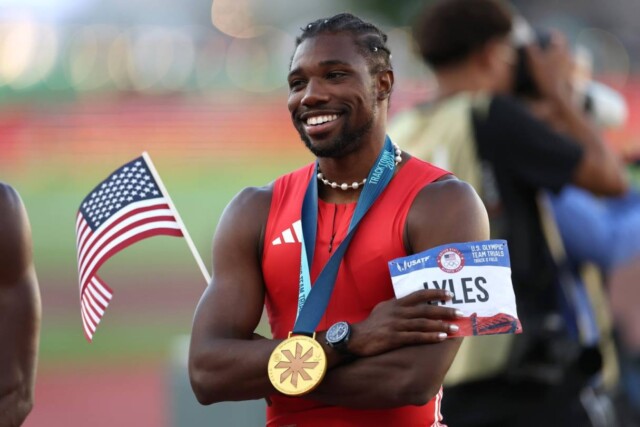Noah Lyles thinks that last winter is the key to understanding how he ended up wearing a gold medal at the U.S. Olympic trials late Sunday night.
Over a month in February and March, he competed in three 60-meter indoor events. He feels they were instrumental in helping him qualify for the Olympics for the first time in an event that had long been considered his second best: the 100 meters.
“That was the goal at trials: win from the 60 meters each time,” Lyles told reporters. “That’s why I performed so many 60s inside. I was practicing, becoming quicker and faster every time.”
Lyles accelerated so quickly late in Sunday’s 100-meter final that as he reached peak speed and eased away from his eight opponents still meters from the finish line, he stretched his right arm high into the pre-dusk sky and gestured to the skies in early joy.
It was his abrupt awareness that, despite a weak performance in the event at the last U.S. trials, he would finally fight for Olympic gold in it. His seventh-place performance in the Tokyo Games trials three years earlier did not qualify him for the 100 meters; instead, he competed in the 200-meter and the 4×100-meter relay.
Lyles finished first in 9.83 seconds on Sunday, slightly ahead of two American men who will join him in Paris as 100-meter runners: Kenny Bednarek (9.87 seconds) and Fred Kerley (9.88 seconds). All three are making their second Olympic debut.
“It’s going time,” said Kerley, the Tokyo Games’ 100-meter silver winner. “Hey, the season began today. So it’s all up and ahead.”
Bednarek, like Lyles, has spent the year attempting to overcome the perception that he is merely a 200-meter runner. Sunday’s silver medal showed that he can also handle the shorter sprints.
“Yeah, I’ll finally call myself a ‘hundred-meter man’ now, but I always knew I had this in me,” said Bednarek. “It was just a matter of time until I made the squad. I had been battling with issues for the last several years, but this year I was healthy, and I’ve always stated that a healthy me is a dangerous me.
Bednarek and Lyles finished second and third in the 200 meters at the past Olympics, adding validity to the idea that they were both better at that event than the 100.
Lyles demonstrated his 100-meter skill by preparing for the trial races in a unique manner. That is what all of his 60-meter indoor entries were about.
“When I first walked out here, it was like, ‘I’m one of the quickest in the field. “I mean, there’s only one other guy faster than me in the 60, so I’m going to take care of business every time,” Lyles said as he prepared for three 100-meter races this weekend.
When I reached the finals, I thought, ‘Alright, we’re going to win from the 60 and keep on.’ Let’s see what happens from there. Every move I made seemed perfect, and I felt comfortable in my position. When we got to the acceleration phase, my hips came through, and I didn’t feel the need to push as hard.”
Lyles led his group in Saturday’s preliminary heats with a 9.92-second mark, but in the semifinals, he sprinted to a wind-aided speed of 9.80 seconds. Then, in the final, he tied his personal best from last summer’s global championships.
“I’d say from this week, I’m pretty confident in the 100,” Lyles told reporters. “Every time I performed a block start, there wasn’t much thought. It was kind of simply done. It was a lot closer to how I felt in the 200, which is something I’ve been looking forward to for quite some time. Every time I receive that sensation, it boosts my confidence in the race.”
That rising confidence explains why Lyles celebrated his major triumph a bit early. As he prepares for the 200-meter preliminaries on Thursday, he is reconsidering such pre-finish activities.
“I told myself I wasn’t going to ease up at the end, but I definitely eased up just to do a celebration,” Lyles told me. “So next time I run, no celebrations.”


